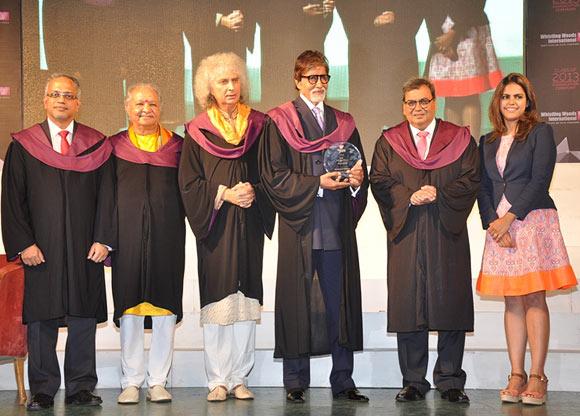 | « Back to article | Print this article |
'No matter what the crisis, always look for an opportunity'
“At my age my father had confronted bigger challenges,” says Meghna Ghai-Puri, daughter of showman Subhash Ghai. In this interview with Prasanna Zore, the 35-year-old president of Whistling Woods International Institute for films, media, animation and media arts talks about her struggles and the lessons she has learnt as an entrepreneur.
It is indeed an hour of crisis for Meghna Ghai-Puri, daughter of showman Subhash Ghai. The 35-year-old president of Whistling Woods International, a film school started by her father in 2001, has to vacate the institute’s Film City campus and hand over the land to the government of Maharashtra in accordance with a Bombay High Court order of February 2012.
About seven months are left until the deadline. And even thought she has invested Rs 100 crore on the school since its inception, Meghna does not appear worried about the future. One, because WWI has filed a review petition in the Bombay High Court which will come up for hearing in January 2014. Two, because 'the Film City campus is just a building and buildings don’t make an institute.'
“At my age my father had confronted bigger challenges,” Meghna says, hoping the High Court will let the film school continue to operate from the Film City campus. But she is also prepared to move out if the High Court rules against them.
Disillusioned, hurt and angry “with the system”, Meghna talks about her struggles, her lessons as an entrepreneur and how she plans to face the eventuality of moving out of Whistling Wood’s Film City campus which she has nurtured with love and passion.
How did Whistling Woods happen to you?
It was my father’s dream. When he first entered the industry he struggled a lot. He was a graduate of the Film and Television Institute of India, Pune and when he came to Mumbai he had no network, no platform or a godfather. He had to make it on his own. Since then he has always said to himself that there should be some formal, constructive place where people who want to make it in the (film) industry can get together, network, have a library and a proper infrastructure to help strugglers.
For the longest time he has been wanting to do that. I have heard him talk about it even when I was a little kid. In 1985 he even submitted an application to the government for starting a film library. But you know how things move and my dad was also busy making films, so he didn’t pursue it aggressively.
In 2000, he got a proposition for an IPO and list Mukta Arts on the stock exchange. I know for a fact that the only reason he wanted to do that was to make movies. He was happy making one movie in one and half year. He knew that the company would be under pressure once he goes public. But his dream was to build a film school and that was going to cost money. And in India, we don’t have that culture of grants or support from any state to build a school like that.
He knew to build such a school he will have to raise funds and when he listed he told his investors that he wanted to put some money towards building a film school. At that time, in the year 2000 Rs 17 crore of the IPO proceeds were dedicated to Whistling Woods.
I had just completed my BSc Honors in business management from King’s College, University of London.
At that time my father was making Yaadein and he told me that he wanted me to come back to India and set up Whistling Woods. I told him I will be there when the building was ready and asked him for some more time. But he said that he wanted me to be the first person on the project and wanted my involvement from the start.
In 2001 I came back to India and started working on the construction plan, and learning about similar film schools all over the world and finding out how they operated. In India we visited the IITs, the IIMs and the Indian School of Business to understand how they were setting up things in India because we were not from an education administration background. During the six years that it took for the Whistling Woods building come up, we were doing all our research. So, as somebody who knew nothing about setting up a film school I got to learn a lot.
We finally launched in 2006 with 75 students and today we have over 450 students across 25 courses and five main schools: school of animation, school of acting, school of film-making and school of media & communication and recently we added the school of fashion.
'Why should the people who actually made mistakes go scot-free?'
You said your father struggled a lot to achieve success. Tell us about your struggles…
Oh God! I can’t even compare my struggles to his. Cannot put it in the same sentence because I had a platform. My father provided me with good education, sent me abroad. I had the money to build Whistling Woods. I had all the support in whatever I wanted to do; I had the support of not only my family but of all the stakeholders of Mukta Arts who believed in our vision.
In that sense, there were no struggles when I started up; there is struggle today.
It is like the taste of success is bitter sweet because we are getting such amazing accolades from all over the world and also from our students. When you get calls from students saying, ‘admission kara do (please get us admitted to your school)’, you think you have really made it.
At the same time it is sad because we don’t know what’s our future. I don’t know why but I am not sure if we will be able to retain our campus we built with so much love and passion. That makes you sad. It sometimes makes me feel like 'why did I come back to India, a country that I love so much, left the city (Mumbai) I loved the most, came back, did all this for ten years and now all that seems kind of worthless.'
But of course when I look at my students, and I have thousands of students working in the industry and are doing extremely well, it makes me think that it was not just about the building.
But yes you do feel like you are not getting the right encouragement as a private party who has put in all our knowledge, resources and effort to produce a world-class film school. Can you see the posters (of actors, directors, stars and technicians interacting with students on various aspects of filmmaking neatly stacked on a wall) in this room?
Each and every person had come here because of the goodwill my father has created in his career as a filmmaker. He has used this goodwill to bring these people to the campus and to interact with our students.
When you put everything into something you value so much and don’t get appreciated, you feel hurt, disillusioned and angry.
Disillusioned and angry with whom?
With the system. Today the government has taken a stand that there was a mistake made while doing this agreement. The judiciary obviously took the fact into consideration that the government itself is agreeing to its mistake then this agreement – signed between Maharashtra Film, Stage and Cultural Development Corporation and Subhash Ghai’s listed company Mukta Arts to run and build WWI in Film City -- is null and void.
My question to everybody is that if the government made mistakes, if the Film Corporation officials made mistakes – and the judgment clearly says that there is no fault of Mukta Arts whatsoever in Whistling Woods, there was no corruption involved – then why are we being penalised?
Why should the people who actually made the mistakes go scot-free? We are the ones getting penalised.
'My father taught me how to be passionate, resilient, diplomatic and manage people'
When is that going to happen and how are you gearing yourself for that eventuality?
July (31) 2014 is when we have to move out of this campus. We have filed a review petition in the Bombay High Court and are hoping that the High Court will see some sense in what we are saying. Our request to the government and the judiciary is just regularise the campus. The building structure is not illegal, we have stuck to the agreement in letter and spirit; we committed to build a film school, we built a film school. We did not build a multiplex or a mall here. We are earnest with what we have done. We were supposed to spend Rs 17 crore for the use of land that the government gave to us and we have ended up spending Rs 100 crore on this institute.
The government contribution is still five acres and not 20 acres because they did not allow us to use the rest of the land. When we asked them permission to build a hostel for students, the Film Corporation refused.
These are all the questions we are going to ask and we are hoping that we make sense and earn sympathy and support for what we have done for the betterment of films and television.
Have you stopped enrolling students to your courses for the next academic year?
Absolutely not. The court order said that the current students have to graduate so we will let you be there till July 2014. We couldn’t have stopped the admissions because as a school we are bleeding Rs 7 crore a year. If I had stopped taking my batches I couldn’t have survived. What we have done is we have informed the students who are enrolling for next year that we may have to shift the campus in July 2014.
Students are aware about it.
Tell is about the influence that Subhash Ghai, the filmmaker, had on you as a person…
Obviously, huge. He is one of those people who is a constant teacher. Had he not been a filmmaker, he would have been a teacher. I see that with his current team also which comprises of younger people. He is always teaching them. Explaining to them why he is taking a particular shot, why did he do this kind of music, and then he gets into the anecdotal mode.
I learnt a lot from him in terms of filmmaking, the craft, but also about passion and resilience. Filmmakers need to be very resilient. He sees so many ups and downs; within a film project also there can be so many problems that can arise. We all look at it as a glamorous world and a fun thing but I think the reason why I didn’t join the industry as a filmmaker or a technician was because when I look at my father I tell myself I can’t do it. I don’t have it in me. I am not that crazy, I am not that passionate. But I see that passion in our students.
To sum it up, as a filmmaker he taught me how to be passionate, resilient, diplomatic, manage people (he has done that beautifully as a filmmaker whether he worked with Dilip Kumar and Raj Kumar to Shah Rukh Khan and even with young actors) I have seen him as a people’s person. Those definitely are qualities I have imbibed from him.
'I am always looking for an opportunity in a crisis'
Lessons learnt as an administrator after you took over Whistling Woods…
Life is full of ups and downs. Whatever the troubles, we need to keep the final goal in mind and move along. You can’t just give up. That is, in fact, one of the challenging things for me to do right now.
There are days when I wake up and say ‘I want to give up. Can I just leave and go?' We have a campus in Pune too and I am like 'let me just go and run that school.’ It is very demotivating or demoralising to think that way but then I pick myself up and say this to myself: my father has faced much bigger challenges at this age; other people who I see around me have bigger challenges and I motivate myself to fight it out.
There is always some silver lining and this is my motto in life: It all happens for the best. I am always looking for an opportunity in a crisis and my tenure at Whistling Woods has taught me no matter what the crisis, you need to look for an opportunity and move along.
What is your silver lining in this hour of crisis?
For better or worse people know about my brand now. Our students and faculty have become so close-knit that even when there are these problems they are bonding so nicely on campus. It is amazing how everybody wants to face this dark hour together with the resolve that we will not let this happen.
Finally, it is up to the judiciary to decide our fate but it is so nice to see that bond. I get emails, messages on Facebook from students and their parents and faculty and they are so heart warming.
The crisis has definitely made the Whistling Woods family stronger and close-knit. Even in the industry everybody wants to help us in this crisis. This has definitely been an advantage that has come out of this crisis.



